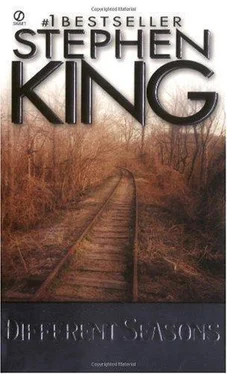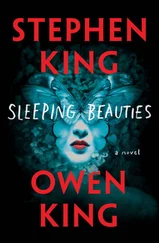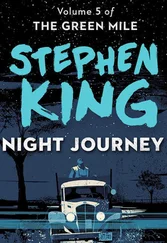That was our Christmas story in the year 197-.
I remember many others, but they do not belong here. Properly speaking, Tozeman's doesn't, either ... but it was the first 'Christmas tale' I heard at 249, and I could not resist telling it And then, on the Thursday after Thanksgiving of this year, when Stevens clapped his hands together for attention and asked who would favour us with a Christmas tale, Emlyn McCarron growled: 'I suppose I've got something that bears telling. Tell it now or tell it never; God'll shut me up for good soon enough.'
In the years I had been coming to 249, I had never heard McCarron tell a story. And perhaps that's why I called the taxi so early, and why, when Stevens passed out eggnog to the six of us who had ventured out on that bellowing, frigid night, I felt so keenly excited. Nor was I the only one; I saw that same excitement on a good many other faces.
McCarron, old and dry and leathery, sat in the huge chair by the fire with the packet of powder in his gnarled hands. He tossed it in, and we watched the flames shift colours madly before returning to yellow again, Stevens passed among us with brandy, and we passed him his Christmas honorariums. Once, during that yearly ceremony, I heard the clink of change passing from the hand of the giver to the hand of the receiver; on another occasion, I had seen a one thousand dollar bill for a moment in the firelight. On both occasions the murmur of Stevens's voice had been exactly the same: low, considerate, and entirely correct. Ten years, more or less, had passed since I had first come to 249 with George Waterhouse, and while much had changed in the world outside, nothing had changed in here, and Stevens seemed not to have aged a month, or even a single day.
He moved back into the shadows, and for a moment there was a silence so perfect that we could hear the faint whistle of boiling sap escaping from the burning logs on the hearth. Emlyn McCarron was looking into the fire and we all followed his gaze. The flames seemed particularly wild that night. I felt almost hypnotized by the sight of the fire - as, I suppose, the cavemen who binned us were once hypnotized by it as the wind walked and talked outside their cold northern caves.
At last, still looking into the fire, bent slightly forward so that his forearms rested on his thighs and his clasped hands hung in a knot between his knees, McCarron began to speak.
2: The Breathing Method
I am nearly eighty now, which means that I was born with the century. All my life I have been associated with a building which stands almost directly across from Madison Square Garden; this building, which looks like a great grey prison -something out of A Tale of Two Cities - is actually a hospital, as most of you know. It is Harriet White Memorial Hospital. The Harriet White after whom it was named was my father's first wife, and she got her practical experience in nursing when there were still actual sheep grazing on the Sheep's Meadow in Central Park. A statue of the lady herself (who would have been my stepmother, had she still been alive when I was born) stands on a pedestal in a pavillion before the building, and if any of you have seen it, you may have wondered how a woman with such a stern and uncompromising face could have found such a gentle occupation. The motto chiselled into the statue's base, once you get rid of the Latin folderol, is even less comforting: There is no comfort without pain; thus we define salvation through suffering. Cato, if you please ... or if you don't please!
I was born inside that grey stone building on 20 March, 1900. I returned there as an intern in the year 1926. Twenty-six is old to be just starting out in the world of medicine, but I had done a more practical internship in France, at the end of World War I, trying to pack ruptured guts back into stomachs that had been blown wide open and dealing on the black market for morphine which was often tinctured and sometimes dangerous.
As with the generation of physicians following World War II, we were a bedrock-practical lot of sawbones, and the records of the major medical schools show a remarkably small number of washouts in the years 1919 to 1928. We were older, more experienced, steadier. Were we also wiser? I don't know ... but we were certainly more cynical. There was none of this nonsense you read about in the popular medical novels, stuff about fainting or vomiting at one's first autopsy. Not after Belleau Wood, where mamma rats sometimes raised whole litters of ratlings in the gas-exploded intestines of the soldiers left to rot in no-man's land. We had gotten all our puking and passing out behind us.
The Harriet White Memorial Hospital also figured largely in something that happened to me nine years after I had interned there - and this is the story I want to tell you gentlemen tonight. It is not a tale to be told at Christmas, you would say (although its final scene was played out on Christmas Eve), and yet, while it is certainly horrible, it also seems to express to me all the amazing power of our cursed, doomed species. In it I see the wonder of our will... and also its horrible, tenebrous power.
Birth itself, gentlemen, is a horrid thing to many; it is the fashion now that fathers should be present at the birth of their children, and while this fashion has served to indict many men with a guilt which I feel they may not deserve (it is a guilt which some women use knowingly and with an almost prescient cruelty), it seems by and large to be a healthful, salubrious thing. Yet I have seen men leave the delivery room white and tottering and I have seen them swoon like girls, overcome by the cries and the blood. I remember one father who held up just fine ... only to begin screaming hysterically as his perfectly healthy son pushed its way into the world. The infant's eyes were open, it gave the impression of looking around ... and then its eyes settled on the father.
Birth is wonderful, gentlemen, but I have never found it beautiful - not by any stretch of the imagination. I believe it is too brutal to be beautiful. A woman's womb is like an engine. With conception, that engine is turned on. At first it barely idles ... but as the creative cycle nears the climax of birth, that engine revs up and up and up. Its idling whisper becomes a steady running hum, and then a rumble, and finally a bellowing, frightening roar. Once that silent engine has been turned on, every mother-to-be understands that her life is in check. Either she will bring the baby forth and the engine will shut down again, or that engine will pound louder and harder and faster until it explodes, killing her in blood and pain.
This is a story of birth, gentlemen, on the eve of that birth we have celebrated for almost two thousand years.
I began practising medicine in 1929 - a bad year to begin anything. My grandfather was able to loan me a small sum of money, so I was luckier than many of my colleagues, but I still had to survive over the next four years mostly on my wits.
By 1935, things had improved a bit. I had developed a bedrock of steady patients and was getting quite a few outpatient referrals from White Memorial. In April of that year I saw a new patient, a young woman whom I will call Sandra Stansfield - that name is close enough to what her name really was. This was a young woman, white, who stated her age to be twenty-eight. After examining her, I guessed her true age to be between three and five years younger than that. She was blonde, slender, and tall for that time - about five feet eight inches. She was quite beautiful, but in an austere way that was almost forbidding. Her features were clear and regular, her eyes intelligent ... and her mouth every bit as determined as the stone mouth of Harriet White on the statue in the pavilion across from Madison Square Garden. The name she put on her form was not Sandra Stansfield but Jane Smith. My examination subsequently showed her to be about two months gone in pregnancy. She wore no wedding ring.
Читать дальше











